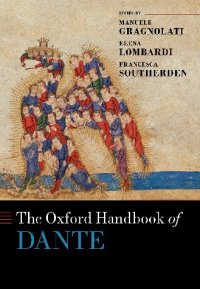
Ebook: The Oxford Handbook of Dante
- Series: Oxford Handbooks
- Year: 2021
- Publisher: Oxford University Press
- Language: English
- pdf
The Oxford Handbook of Dante contains forty-four specially written chapters that provide a thorough and creative reading of Dante's oeuvre. It gathers an intergenerational and international team of scholars encompassing diverse approaches from the fields of Anglo-American, Italian, and
continental scholarship and spanning several disciplines: philology, material culture, history, religion, art history, visual studies, theory from the classical to the contemporary, queer, post- and de-colonial, and feminist studies. The volume combines a rigorous reassessment of Dante's formation,
themes, and sources, with a theoretically up-to-date focus on textuality, thereby offering a new critical Dante. The volume is divided into seven sections: 'Texts and Textuality'; 'Dialogues'; 'Transforming Knowledge'; Space(s) and Places'; 'A Passionate Selfhood'; 'A Non-linear Dante'; and
'Nachleben'. It seeks to challenge the Commedia-centric approach (the conviction that notwithstanding its many contradictions, Dante's works move towards the great reservoir of poetry and ideas that is the Commedia), in order to bring to light a non-teleological way in which these works relate
amongst themselves. Plurality and the openness of interpretation appear as Dante's very mark, coexisting with the attempt to create an all-encompassing mastership. The Handbook suggests what is exciting about Dante now and indicate where Dante scholarship is going, or can go, in a global context.
continental scholarship and spanning several disciplines: philology, material culture, history, religion, art history, visual studies, theory from the classical to the contemporary, queer, post- and de-colonial, and feminist studies. The volume combines a rigorous reassessment of Dante's formation,
themes, and sources, with a theoretically up-to-date focus on textuality, thereby offering a new critical Dante. The volume is divided into seven sections: 'Texts and Textuality'; 'Dialogues'; 'Transforming Knowledge'; Space(s) and Places'; 'A Passionate Selfhood'; 'A Non-linear Dante'; and
'Nachleben'. It seeks to challenge the Commedia-centric approach (the conviction that notwithstanding its many contradictions, Dante's works move towards the great reservoir of poetry and ideas that is the Commedia), in order to bring to light a non-teleological way in which these works relate
amongst themselves. Plurality and the openness of interpretation appear as Dante's very mark, coexisting with the attempt to create an all-encompassing mastership. The Handbook suggests what is exciting about Dante now and indicate where Dante scholarship is going, or can go, in a global context.
Download the book The Oxford Handbook of Dante for free or read online
Continue reading on any device:

Last viewed books
Related books
{related-news}
Comments (0)